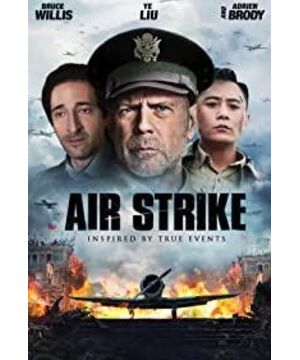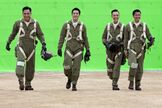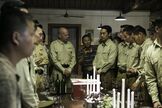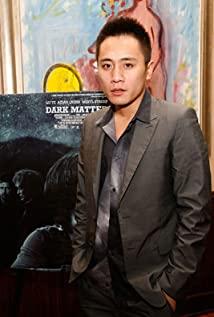"The Big Bombing" has no injuries and no pain, so we can't feel the cruelty of war through the film at all.
I don't care much about the trivial matters outside the film. Whether it is tax evasion or money laundering, it is the public opinion that the public is right and the mother is right, and it is not necessary to use it as a reference argument for the film until there is no conclusion. We only need to talk about things when we watch movies.
First of all, the structure of the film is very confusing, and the chaos is a bit overwhelming. I don't know what I want the audience to see, and every part is endless. Several stories intersect with no clear purpose and relationship, and they are bluntly broken apart, and the editing is a flaw.
The editing strength in many parts of the film is somewhat insufficient. From the emotions to the narrative, it makes people want to cry without tears or even choked up. The cliff is only restrained from the cliff, but how can people be moved? There is a kind of no waves like walking on the sidewalk, whether it is the aerial combat that should have stimulated the accelerated secretion of hormones, or the historical suffering that should have harvested sympathy, all of which are not what they expected.
The purpose of the Air Force, led by Bruce Willis, was unclear, and all cores were lost in repetitive, shoddy, and unimpressive air combat. In the end, they did not express what they were doing, what they had solved, and how could people feel their fearlessness and greatness. Liu Ye was in charge of the espionage battle, and he was so thin that people immediately forgot about this big bombing. If it weren't for the interspersed plane chases, you would have doubted that you were watching a similar TV series. The scene was unrefined and the conflict had no dramatic tension. It can be said that there is no danger or danger, because the danger is broken in seconds. The folk forces headed by Teacher Fan (Fan Wei) were supposed to be responsible for harvesting tears in the film, but the editing made this part dull, like chewing wax. The kind of Chinese-style humor that Mr. Fan brought with him should have propped up optimism in suffering, and stubbornly mocking and disdainful of fate, but no matter what, it made people feel very mindless, just like Mr. Fan was also isolated from the war. The film has an inexplicable feeling from beginning to end. Every scene lacks shots, but the number of scenes in the film is extremely rich, and the richness is surprisingly repeated.
The lens design of the film is nothing new, and the audience always feels like they are watching the kind of cheap war documentaries that were broadcast on TV sets a few years ago. There is not enough emotion in the dialogue part, and there is no sense of substitution. The language of the camera lens has no contribution to the narrative and emotional contrast of the film. Photography here is simply equivalent to photography.
The director's weak audio-visual language and lack of psychological grasp will not take advantage of the audience's baptism compensation and audio-visual illusions to tell the story, resulting in the whole film doing 1+1+1+1 like building blocks +1=0 situation. Like a spread out pie, there is no weight or detail.
Two sets of love lines make you think that war is not so urgent and tense, but rather a catalyst for true love.
Mr. Fan's loss of his son doesn't seem to be his own. I really don't know that donations during the war need to turn such a big corner. If there is no gambling competition, no one will donate money. This war is not a casualty of entertainment.
As a movie, the innate attribute of this theme is an epic volume, but we don't have the feeling of seeing "Pearl Harbor", "Apocalypse Now", "Dunkirk" and other movies at all. Doubtful.
Here are some interesting places
In the following two pictures, the red marks are the same, and the blue are the differences.
There is a 10-minute interval between the above two pictures in the film. It is not known how long the time and space of the story are, but we can easily find many similarities, and this similarity does not refer to the furnishings of the scene. The logic after the bombing is puzzling, not only talking about the dynamics of the characters inside. Who can be so accurate in reality? The dynamic, position, direction, and number of characters in each group of red markers are exactly the same, which is considered a miracle. Is this the same iron discipline?
The picture below is more interesting.
The difference between several shots is more than 40 minutes. The scene of the film has exploded at 4 minutes and 44 seconds of the first shot, and the bullet point is also very clear. The ship parked under the camera can accurately push out the position of the crater, 5 minutes 06 In seconds, the surrounding buildings have changed beyond recognition. And after 40 minutes, the bombed steps and buildings were miraculously restored? There are no more craters on the steps, and the stones have been repaired. It doesn't look like a war. Is it filming?
For example, there are many scenes of wearing help in the front, and there are many puzzling scenes and scenes that are not listed one by one.
As a digression, Mr. Cui Yongyuan's call for everyone to resist the bombing is simply an insult to the IQ of the Chinese audience. If such a film can be popular, I really don't know if people will seriously make movies in the future.
View more about Air Strike reviews











